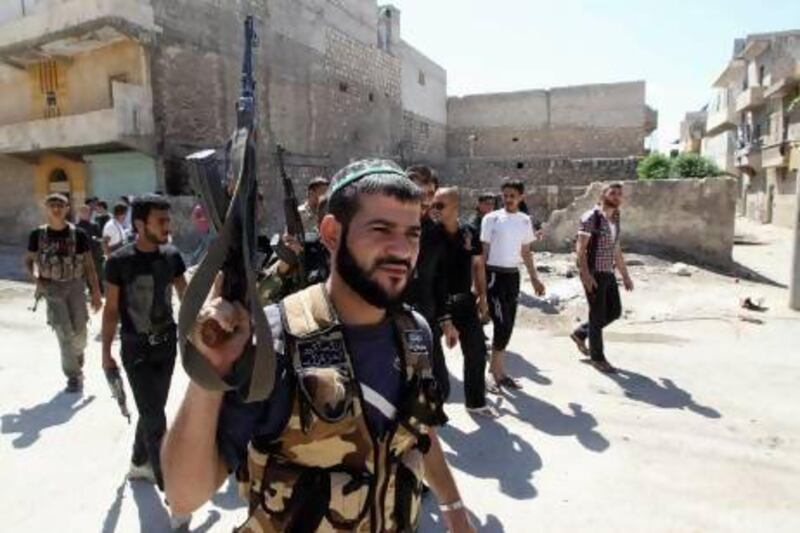Istanbul // The Free Syrian Army has offered powerful Islamist rebel groups a share of advanced new weapons if they unify under the FSA banner.
General Salim Idriss, commander of the FSA, the name under which moderate rebel units fight, appealed to leaders of independent Islamist brigades - which are currently not part of the alliance he leads - to join its ranks, according to a leading figure from one of the armed Islamist factions involved in the talks.
"Idriss offered to support the Islamist factions by sharing the weapons he expects to receive, if they joined an alliance with the FSA and agree to certain conditions," the Damascus-based rebel said yesterday.
He was briefed on the summit of anti-regime forces that took place in the Turkish capital Ankara on Thursday but declined to say what conditions Gen Idriss had set, adding that the militant Islamist groups had responded and would consider a deal but had their own set of conditions to be met before an agreement is reached.
The West has been wary of supplying weapons to rebels, fearing that radical fighters could use the arms against western targets or Israel.
Militant brigades that have so far shunned the FSA follow a range of ideologies from moderate Islamists to ultra-conservative Salafists and foreign fighters afflilliated with Al Qaeda.
Thursday's apparent overture by Gen Idriss appears to have offered to share advanced US-supplied weapons with conservative Salafist factions - on condition they act in concert with the FSA and guarantee not to pass munitions on to the even more radical Jabhat Al Nusra, said another opposition activist who was aware of the meeting.
Thursday's apparent overture by Gen Idriss appears to have offered to share advanced US-supplied weapons with factions that include conservative Salafists - on condition they act in concert with the FSA and guarantee not to pass munitions on to the even more radical Jabhat Al Nusra, said another opposition activist who was aware of the meeting.
"Idriss will insist that there are inspections and audits of all weapons used, especially anything like anti tank or anti-aircraft missiles. He knows the Islamist groups coordinate with Nusra and knows supplies to him will be stopped if any of the weapons turn up in Nusra's hands," he said.
The FSA is backed by the US, Saudi Arabia and Turkey but Syria's opposition has struggled to unite both on a political and military level, with scores of different factions under different leaders failing to present a coherent anti-regime bloc.
Divided and under-resourced, they have been unable to make headway against President Bashar Al Assad, who enjoys strong, unified backing from Iran, Russia and Hizbollah.
The US and Saudi Arabia, supporting the Syrian opposition, have renewed efforts to bring anti-regime factions together, alarmed by the regime's staying power and rising militancy among rebels.
"This was really a first meeting to try to create a new alliance between the FSA and the Islamist groups, they all agreed they share the same goal to overthrow the regime and that no matter what they would never fight against one another," the rebel said.
"Idriss wants them to unite their forces, he told them all Syria was a country of moderate Muslims and that they had the same cause," the rebel said.
The US decided last week it would arm moderate, nationalist factions fighting under Gen Idriss' command.
Jabhat Al Nusra, which is allied to Al Qaeda and classified a terrorist organisation by the US, did not attend Thursday's meeting in Ankara. But Ahrar Al Sham, Ansar Al Sunna, Liwa and Sahabi and other prominent Islamist factions did participate, the rebel briefed on the talks said.
Al Nusra, classified a terrorist organisation by the US, did not attend Thursday's meeting in Ankara. But Ahrar Al Sham, Ansar Al Sunna, Liwa and Sahabi and other prominent Islamist factions did take part, the rebel briefed on the talks said.
He also said a delegation from Qatar had been in attendance - the only non-Syrian presence at the meeting. That had surprised those taking part, the rebel said, but might have been linked to the summit of opposition backers, known as The Friends of Syria, due to take place in Doha today.
Qatar has been a major supplier of arms and cash to rebel factions, although many in the Syrian opposition and their international supporters say those supplies have ended up in the hands of extremist Islamic factions.
The meeting took place as rebels in Damascus and Aleppo come under growing pressure from forces loyal to Mr Al Assad, following their victory earlier this month in the symbolically and strategically important fight for Qusayr.
Regime forces subsequently launched an offensive on Aleppo, Syria's largest city and commercial capital, large parts of which have been in rebel hands for almost a year.
That offensive has been stalled, in part thanks to a recent influx of portable anti-tank and anti-aircraft missiles from Gulf countries, according to the Associated Press.
Those supplies have however, heightened tensions and rivalries between different rebel factions, with some groups receiving supplies while others struggle on with small arms and a shortage of basic ammunition.
Rebels in Damascus yesterday said they have yet to benefit from any new weapons.
"We've not seen anything yet, we've heard a lot about these new supplies but they haven't reached us and I do not know if they are going to," said a member of an Islamist rebel group in the capital.
According to Reuters, rebels expect a new weapons supply line from Jordan to open up soon. Opposition groups have sourced most of their weapons from regime bases, overrun by the rebels, or from Gulf-funded purchases shipped down from Turkey into northern Syria.
psands@thenational.ae





